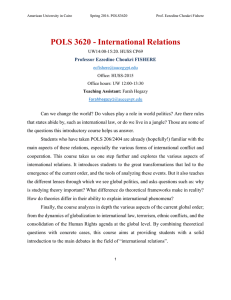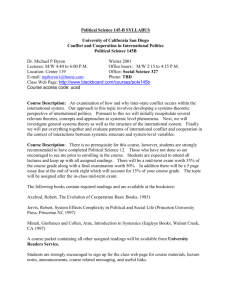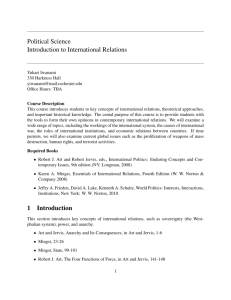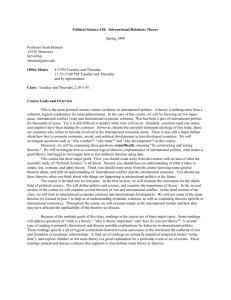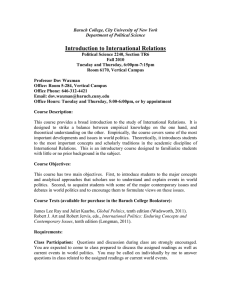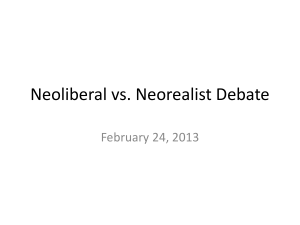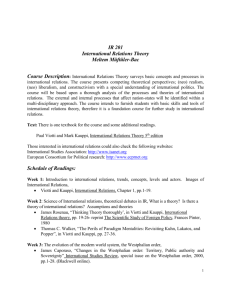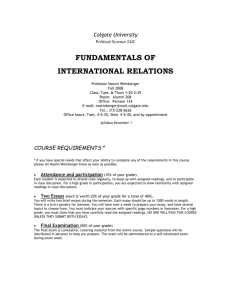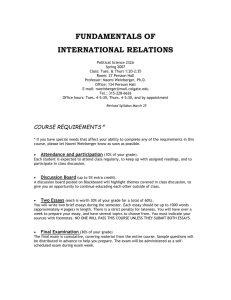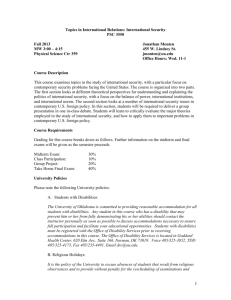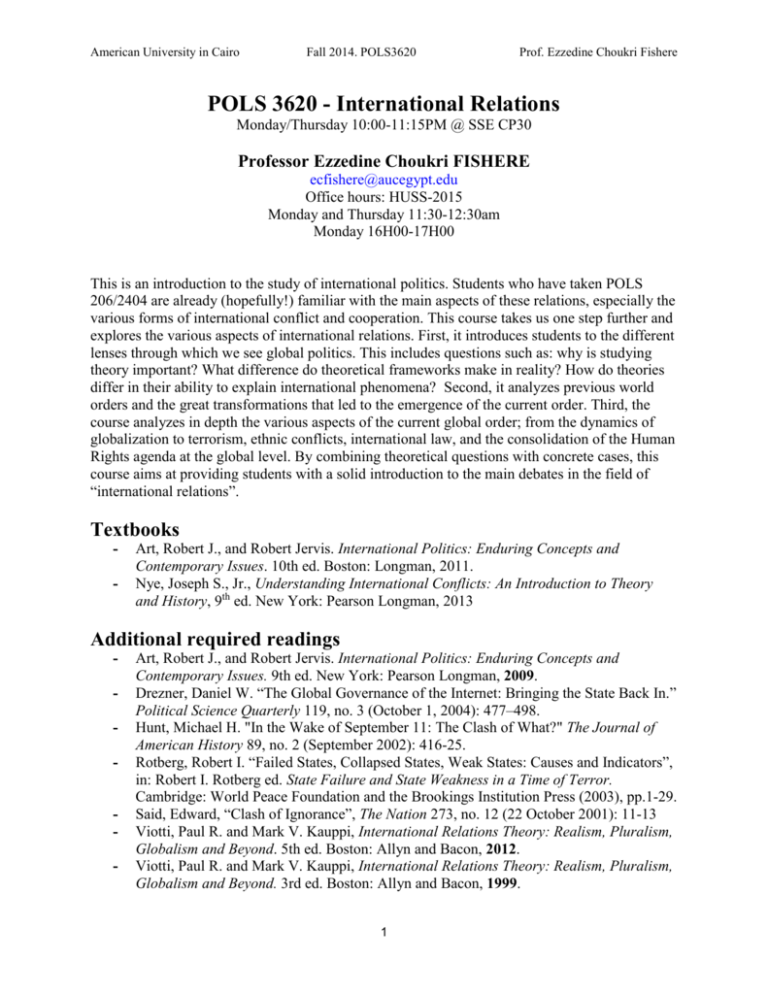
American University in Cairo
Fall 2014. POLS3620
Prof. Ezzedine Choukri Fishere
POLS 3620 - International Relations
Monday/Thursday 10:00-11:15PM @ SSE CP30
Professor Ezzedine Choukri FISHERE
ecfishere@aucegypt.edu
Office hours: HUSS-2015
Monday and Thursday 11:30-12:30am
Monday 16H00-17H00
This is an introduction to the study of international politics. Students who have taken POLS
206/2404 are already (hopefully!) familiar with the main aspects of these relations, especially the
various forms of international conflict and cooperation. This course takes us one step further and
explores the various aspects of international relations. First, it introduces students to the different
lenses through which we see global politics. This includes questions such as: why is studying
theory important? What difference do theoretical frameworks make in reality? How do theories
differ in their ability to explain international phenomena? Second, it analyzes previous world
orders and the great transformations that led to the emergence of the current order. Third, the
course analyzes in depth the various aspects of the current global order; from the dynamics of
globalization to terrorism, ethnic conflicts, international law, and the consolidation of the Human
Rights agenda at the global level. By combining theoretical questions with concrete cases, this
course aims at providing students with a solid introduction to the main debates in the field of
“international relations”.
Textbooks
-
Art, Robert J., and Robert Jervis. International Politics: Enduring Concepts and
Contemporary Issues. 10th ed. Boston: Longman, 2011.
Nye, Joseph S., Jr., Understanding International Conflicts: An Introduction to Theory
and History, 9th ed. New York: Pearson Longman, 2013
Additional required readings
-
Art, Robert J., and Robert Jervis. International Politics: Enduring Concepts and
Contemporary Issues. 9th ed. New York: Pearson Longman, 2009.
Drezner, Daniel W. “The Global Governance of the Internet: Bringing the State Back In.”
Political Science Quarterly 119, no. 3 (October 1, 2004): 477–498.
Hunt, Michael H. "In the Wake of September 11: The Clash of What?" The Journal of
American History 89, no. 2 (September 2002): 416-25.
Rotberg, Robert I. “Failed States, Collapsed States, Weak States: Causes and Indicators”,
in: Robert I. Rotberg ed. State Failure and State Weakness in a Time of Terror.
Cambridge: World Peace Foundation and the Brookings Institution Press (2003), pp.1-29.
Said, Edward, “Clash of Ignorance”, The Nation 273, no. 12 (22 October 2001): 11-13
Viotti, Paul R. and Mark V. Kauppi, International Relations Theory: Realism, Pluralism,
Globalism and Beyond. 5th ed. Boston: Allyn and Bacon, 2012.
Viotti, Paul R. and Mark V. Kauppi, International Relations Theory: Realism, Pluralism,
Globalism and Beyond. 3rd ed. Boston: Allyn and Bacon, 1999.
1
American University in Cairo
Fall 2014. POLS3620
Prof. Ezzedine Choukri Fishere
Evaluation
1. Attendance
Six absences, regardless of the justification, automatically generate an F grade.
2. Participation
10%
- Students’ participation refers mainly to reading the required texts before class. This is
the basis of the discussion taking place in class, and therefore constitutes an integral part
of the learning process.
3. Midterm I
15%
- The exam aims at measuring and enhancing students’ ability to synthesize and
consolidate the material they learn during the first section of the course.
4. Midterm II
20%
- The exam aims at stimulating students’ ability to synthesize the material they learn
during the second section of the course.
5. Midterm III
25%
- The exam aims at stimulating students’ ability to synthesize the material they learn
during the third section of the course.
6. Final Exam
- A comprehensive exam at the end of the semester
30%
Format of submissions
-
Submissions should be typed in Times New Roman font, size 12, spaced in 1.5, 1-inch
margin each side, on regular A4 sheets.
Work should be concise, reflect clarity of thinking, and follow a logical presentation.
Expectations
-
Students are required to read the texts thoroughly before coming to class. Not reading
means a loss of the participation grade.
The AUC has a zero-tolerance policy regarding academic integrity. It will be applied
vigorously.
Attendance will be taken at the beginning of class; late-comers will be counted as absent.
Students are expected to observe general rules of civility (turn off your mobile phone
before you come, listen to your colleagues and avoid interrupting them, don’t monopolize
the discussion, be considerate of others, etc.).
Negotiation is a virtue that students will not need in this course in any shape or form.
2
American University in Cairo
Fall 2014. POLS3620
Prof. Ezzedine Choukri Fishere
Schedule
8/9
Introduction.
11/9
-
The explanation of IR
Nye, 1-16
15/9
-
Realism I
Viotti and Kauppi (2012), pp. 39-68, 74-80
18/9
-
Realism II
Hans Morgenthau, “Six Principles of Political Realism”, in: Art and Jervis (2011), pp.
16-23
Kenneth Waltz, “The Anarchic Structure of World Politics”, in: Art and Jervis (2011),
pp. 37-57
22/9
-
Pluralist Approaches I
Viotti and Kauppi (2012): pp. 129-164
25/9
-
Pluralist Approaches II
Robert O. Keohane, “International Institutions: Can Interdependence Work?” in: Art and
Jervis (2011), pp. 150-158
Graham Allison, “Conceptual Models and the Cuban Missiles Crisis.” In: Viotti and
Kauppi (1999), pp. 280-296
-
Saturday 27/9 (double session)
Critical Theories
- Viotti and Kauppi (2012), pp.189-216
- Immanuel Wallerstein, “The Modern World System as a Capitalist World Economy” in:
Viotti and Kauppi (2012), pp. 227-233
29/9
-
Critical Theories (continued)
Alexander Wendt, “Anarchy is what States Make of It”, in: Art and Jervis (2011): pp. 6167
2/10
Mid-Term I (in class)
3-7/10 Eid Break
9/10
-
Peloponnesian War
Documentary
Saturday 11/10 (double session)
- Documentaries
Great Modern Wars
13/10 Peloponnesian War
- Nye, 16-34
3
American University in Cairo
Fall 2014. POLS3620
Prof. Ezzedine Choukri Fishere
16/10 International conflicts: World War I
- Nye, 77-108
20/10 International Conflicts: World War II
- Nye, 111-138
23/10 International conflicts: The Cold War
- Nye, 141-189
27/10 The UN System
- The UN Charter (available online: http://www.un.org/en/documents/charter/)
- Adam Roberts, “The United Nations and International Security”, in: Art and Jervis
(2011): pp. 524-532
30/10 Mid-Term II (in class)
3/11
-
Globalization
Nye, 254-282
6/11
-
Global Communication
Nye, 285-313
Drezner, Daniel W. “The Global Governance of the Internet: Bringing the State Back In.”
Political Science Quarterly 119, no. 3 (October 1, 2004): 477–498.
10/11 Global Environmental Governance
- Garett Hardin, “The Tragedy of the Commons”, in: Art and Jervis (2011), pp. 502-506
- David G. Victor, “International Cooperation on Climate Change: Numbers, Interests and
Institutions”, in: Art and Jervis (2011), pp. 515-523
13/11 Ethnic Conflicts/Failed States
- Robert I. Rotberg, “Failed States, Collapsed States, Weak States: Causes and Indicators”,
in: Robert I. Rotberg ed. State Failure and State Weakness in a Time of Terror (2003),
pp.1-29.
- Nye, 206-251
17/11 Terrorism
- Bruce Hoffman, “What is Terrorism?” in: Art and Jervis (2011), pp. 185-195.
- Robert A. Pape, “The Strategic Logic of Suicide Terrorism”, in: Art and Jervis (2011),
pp. 213-230.
20/11 Human Rights, Responsibility to Protect and Transitional Justice
- Rhoda E. Howard and Jack Donnelly, “Human Rights and World Politics”, in: Art and
Jervis (2011), pp. 450–462
- Kofi Annan, “Reflections on Intervention”, in: Art and Jervis (2011), pp. 463-468.
- Neil Kritz, “The Dilemmas of Transitional Justice”, in: Art and Jervis (2009), pp. 529537
4
American University in Cairo
24/11
-
Fall 2014. POLS3620
Prof. Ezzedine Choukri Fishere
Civilization and Identity
Huntington, “The Clash of Civilizations”, in: Art and Jervis (2009), pp. 395-410
Hunt, “In the Wake of September 11: The Clash of What?”
Said, “Clash of Ignorance”
27/11 Thanksgiving
1/12
Mid-Term III
4/12
-
International Law
Stanley Hoffmann, “The Uses and Limits of International Law”, in: Art and Jervis
(2011): pp. 145-149
Nye, 193-206
Steven R. Ratner, “International Law: The Trials of Global Norms,” in: Art and Jervis
(2011): pp. 469-474
-
8/12
-
The Use of Force
Robert J. Art, “The Fungibility of Force”, in: Art and Jervis (2011): pp. 196-212
11/12 New Actors
- Margaret E. Keck and Kathryn Sikkink, “Transnational Activist Networks,” in: Art and
Jervis (2011): pp. 475-481
- Sebastian Mallaby, “NGOs: Fighting Poverty, Hurting the Poor,” in: Art and Jervis
(2011): pp. 482-488
Final Exam
5

